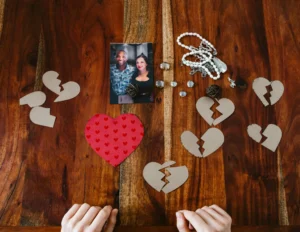Relationships can be a beautiful part of life, offering companionship, love, and support. But when codependency creeps in, what should be a source of joy can turn into a cycle of emotional exhaustion and self-sacrifice.
If you’ve ever felt like your entire world revolves around your partner’s happiness—or that you’re losing yourself trying to keep them afloat—you might be dealing with codependency.
The good news is that recovery is within reach, and it starts with understanding what’s happening and taking steps to reclaim your independence.
In this article, I’ll walk you through what codependency in relationships means, why breaking free from it is so important, and practical steps to recover based on my own experiences and insights from experts.
Whether you’re just starting to recognize these patterns or you’re ready to make a change, this guide is here to help you build a healthier, more balanced life.
What is Codependency in Relationships?
Codependency is a behavioral pattern where one person relies too heavily on another for emotional support, approval, or even their sense of identity.
In a relationship, this often looks like one partner constantly putting the other’s needs first, even when it means ignoring their own well-being. It’s not about love or care in a healthy sense—it’s about an unbalanced dynamic where one person feels compelled to “fix” or “save” the other.
I’ve been there myself. For years, I thought my role in my relationship was to manage my partner’s emotions, smooth over every conflict, and keep everything running smoothly.
If they were upset, I felt it was my fault. If they were happy, I took credit. It wasn’t until I started digging into what codependency really means that I saw how much I’d lost touch with myself in the process.
Signs of Codependency
Not sure if codependency is an issue for you? Here are some common signs to look out for:
-
People-pleasing tendencies: You go out of your way to make your partner happy, even if it drains you.
-
Struggling to say no: You agree to things you don’t want to do because you’re afraid of upsetting them.
-
Low self-esteem: Your worth feels tied to how much your partner needs or approves of you.
-
Fear of abandonment: You stay in the relationship, even if it’s unhealthy, because being alone terrifies you.
-
Over caretaking: You take on your partner’s problems—emotional or otherwise—as if they’re your own.
In my case, I’d spend hours worrying about how to avoid an argument or make my partner’s day better, even if it meant skipping plans I’d made for myself.
I’d apologize for things I hadn’t done, just to keep the peace. Looking back, those were clear red flags of codependency.
Why Recovery Matters
Breaking free from codependency isn’t just about fixing your relationship—it’s about healing yourself. Living in a codependent dynamic can leave you feeling anxious, resentful, and disconnected from who you are.
Over time, it can chip away at your mental health and leave you wondering why you’re so exhausted all the time. Recovery offers a chance to rediscover your own voice, set boundaries, and build a relationship that’s based on mutual respect instead of emotional dependency.
How To Recover From Codependency in a Relationship
Recovery from codependency is a process, not an overnight fix. It takes effort, self-awareness, and a willingness to step out of old habits. Below, I’ve outlined six actionable steps that helped me—and can help you—move toward a healthier, more independent life.
1. Acknowledge the Problem
You can’t change what you don’t see. The first step is to take an honest look at your relationship and your role in it. Ask yourself: Do I feel like I’m always “on call” for my partner? Am I sacrificing my own happiness to keep them stable?
Writing down your thoughts can make this clearer—try jotting down moments when you’ve felt overwhelmed or taken on more than you should.
My Experience: I started keeping a journal after a friend suggested it. At first, I didn’t want to admit how much I was carrying—every bad mood my partner had felt like my burden to fix. Seeing it on paper was a wake-up call that I couldn’t ignore.
2. Seek Professional Help
Therapy can be a game-changer when it comes to codependency recovery. A licensed therapist, especially one familiar with relationship dynamics, can help you unpack why you’ve fallen into these patterns and give you tools to break free.
Cognitive Behavioral Therapy (CBT) is particularly effective for challenging thoughts like “I’m only lovable if I’m useful” or “I can’t survive without this relationship.”
Expert Insight: Dr. Robert Weiss, a renowned therapist specializing in relationship issues, says,
“Therapy provides a safe space to rebuild your sense of self, separate from your partner’s needs.”
If you’re new to therapy, look for someone with experience in codependency or emotional dependency—they’ll get where you’re coming from.
My Experience: I was hesitant to try therapy at first—it felt like admitting defeat. But after a few sessions, I realized it wasn’t about blame; it was about understanding myself better. It gave me clarity I couldn’t find on my own.
3. Join a Support Group
There’s power in community. Groups like Codependents Anonymous (CoDA) bring together people who understand what you’re going through. They offer a place to share your story, hear others’, and pick up practical tips for recovery. Plus, it’s comforting to know you’re not alone.
My Experience: Walking into my first CoDA meeting felt awkward—I wasn’t sure what to expect. But listening to people talk about their struggles with people-pleasing and fear of abandonment hit home. It was like they were reading my mind. That connection kept me going when things got tough.
4. Practice Self-Care in Relationships
Self-care isn’t a buzzword—it’s a lifeline when you’re recovering from codependency. It’s about giving yourself permission to exist outside of your partner’s needs.
Start small: take a walk alone, pick up a hobby you love, or spend time with friends you’ve drifted from. These acts remind you that your happiness doesn’t have to depend on someone else.
Practical Tips:
-
Block off 20-30 minutes a day for something just for you—no guilt allowed.
-
Try mindfulness exercises like deep breathing to stay grounded.
-
Rediscover an old passion—something that’s yours, not tied to the relationship.
My Experience: I used to love photography, but I’d stopped because I was too busy managing my partner’s life. When I picked up my camera again, it felt like meeting an old friend. It wasn’t about escaping—it was about remembering who I was.
5. Learn to Set Boundaries in Relationships
Boundaries are the backbone of a healthy relationship, but they’re tough to establish if you’re used to saying yes to everything. A boundary is simply a line that protects your energy and lets your partner know what you’re okay with—and what you’re not. It’s not about pushing them away; it’s about making space for yourself.
How to Set Boundaries:
-
Be clear: Say something like, “I need some time to recharge tonight—can we talk tomorrow?”
-
Start small: Practice declining little requests that feel overwhelming.
-
Stick to it: If they push back, gently reinforce your limit.
My Experience: The first boundary I set was saying no to a late-night vent session when I was exhausted. My partner was surprised, and I felt guilty at first. But the next day, I had more energy to listen—and they respected me more for it. It was a small win that built my confidence.
6. Build Independence
Codependency thrives when your identity is tangled up in someone else’s. Recovery means untangling that knot and finding out who you are on your own.
Set personal goals, nurture friendships, and work on liking yourself without needing someone else’s approval.
Actionable Steps:
-
Pick a goal—like learning to cook a new dish or running a 5K—and chase it.
-
Call a friend you haven’t seen in a while and make plans.
-
Write down three things you like about yourself that have nothing to do with your partner.
My Experience: I decided to take a weekend trip alone, something I’d never done. I was nervous, but planning it and enjoying my own company showed me I didn’t need to lean on anyone to feel complete. It was liberating.
Challenges You Might Face in Recovery
Recovery isn’t a straight line—there are bumps along the way. Knowing what to expect can help you push through when it gets hard. Here are some challenges I ran into and how I dealt with them.
Fear of Abandonment
When you start setting boundaries or focusing on yourself, it’s normal to worry your partner might pull away. I used to think, “If I stop being everything they need, they’ll leave.”
But here’s the truth: a good relationship can handle growth. If they can’t, that’s a sign it wasn’t healthy to begin with.
My Experience: Early on, I panicked every time my partner seemed distant after I set a boundary. Over time, I saw they were adjusting too—and our connection got stronger because of it.
Guilt and Shame
Putting yourself first can feel wrong when you’re used to being the caretaker. I’d catch myself thinking, “I’m selfish for not helping more.” To get past this, I had to remind myself that self-care isn’t a luxury—it’s a need.
Expert Insight: Melody Beattie, in her book Codependent No More, puts it perfectly:
“You’re not abandoning anyone by taking care of yourself—you’re just filling your own cup so you can give from a place of strength.”
Breaking Old Habits
Old patterns die hard. Even after months of work, I’d slip into over-apologizing or trying to fix my partner’s bad moods. When that happened, I’d take a breath, recognize it, and refocus on what I’d learned.
My Experience: Just last week, I caught myself saying “sorry” for something that wasn’t my fault. I laughed it off and told myself, “Progress, not perfection.” It’s a marathon, not a sprint.
How Codependency Affects Mental Health
Codependency doesn’t just strain your relationship—it can wreak havoc on your mind. Here’s what I noticed in myself and what research backs up:
-
Anxiety: Constantly worrying about your partner’s feelings or the state of the relationship.
-
Depression: Feeling stuck or like you’ve lost your spark.
-
Burnout: Being emotionally drained from carrying too much.
For me, the anxiety was the worst. I’d lie awake wondering how to make things better, even when it wasn’t my mess to clean up. Once I started focusing on my own needs, that weight began to lift—not all at once, but bit by bit.
Communication: A Key to Recovery
You can’t recover in silence. Talking to your partner about what you’re going through—and why you’re changing—builds understanding and keeps the relationship on track. It’s not about blame; it’s about honesty.
Tips for Better Communication:
-
Say “I feel” instead of “You do”—like, “I feel stretched thin when I take on too much.”
-
Be clear about what you need: “I’d like us to split chores more evenly.”
-
Listen to their side and acknowledge it: “I get that you’re stressed too.”
My Experience: When I told my partner I was working on codependency, I was scared they’d take it personally. Instead, they asked how they could help. That conversation opened the door to a more equal partnership.
Conclusion:
Recovering from codependency in a relationship is hard, beautiful work. It’s about letting go of emotional dependency and stepping into a version of yourself that’s strong, independent, and whole.
You don’t have to do it perfectly—just start. Acknowledge where you are, reach out for support, and take it one day at a time.
If this resonates with you, I’d love to hear your story. Have you struggled with codependency? What’s helped you move forward? Drop a comment below—your experience might be the encouragement someone else needs.










